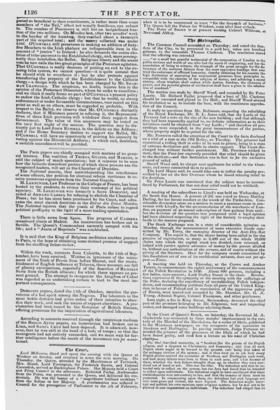eta likstrapalti.
The Common Council assembled on Thursday; and voted the free- dom of the City, to be presented in a gold box, value one hundred guineas, to the venerable Thomas Clarkson. The resolution stated that the offering was intended "as a small but grateful testimonial of the corporation of London to the public services and worth of one who had the merit of originating, and has the consolation of living to witness, the triumph of the great struggle for the de- liverance of the enslaved African from the most oppressive bondage that ever tried the endurance of afflicted humanity, thereby obtaining for his country the high distinction of separating her commercial greatness from principles in- compatible with the exercise of the religion of mercy, and achieving a moral victory, whose trophies shall endure while justice, freedom, the clemency or power, and the peaceful glories of civilization shall have a place in the admira- tion of maokind."
The motion was made by Sheriff Wood, and seconded by Sir Peter Laurie. Mr. Richard Taylor proposed that a bust of Mr. Clarkson should be executed and placed in the Hall ; and Sheriff Wood altered his resolution so as to include the bust, with the unanimous approba- tion of the Council.
In reply to questions from Mr. Robinson, respecting the rebuilding of the Royal Exchange, Mr. R. L. Jones said, that the Lords of the Treasury had a veto on the site of the new building ; and that although they had been repeatedly applied to, no definite information as to their intentions could be obtained from " my Lords ; " and therefore all pro- ceedings were suspended, to the great inconvenience of the parties, whose property might be required for the site.
Mr. Pewtress called the attention of the Court to the facts disclosed on a trial of a man at the Old Bailey, on Tuesday. The prisoner had committed a trifling theft in order to be sent to prison, being in a state of extreme destitution and unable to obtain support. The Court dis- charged him without further punishment. Mr. Pewtress wished to state, that the Poor-law expressly provided that relief should be given to the destitute—and that destitution was in fact to ,be the exclusive ground of relief. Sheriff Wood said, he always sent applicants for relief to the Over- seers, and never committed them to prison. The Lord Mayor said, lie would take care to inflict the penalty pre- scribed by law on the first Overseer whom he found refusing relief to the destitute.
Sir Peter Laurie was convinced that the subject must be reconsi- dered by Parliament, for that out-door relief could not be withheld.


























 Previous page
Previous page